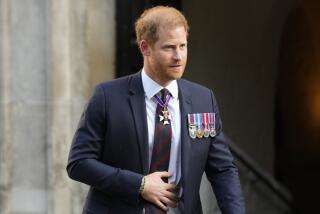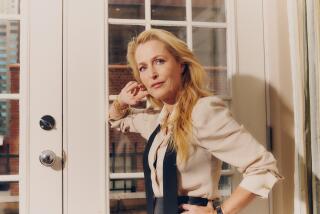Prince Andrew’s Chinese spy drama again pushes King Charles III to rein in scandal-prone brother

- Share via
LONDON — How do you solve a problem like Prince Andrew?
That’s the question facing King Charles III as the drama surrounding his 64-year-old brother roils Britain and the monarchy once again.
In the latest episode, a Chinese businessman has been barred from the U.K. because of concerns he cultivated links with Andrew in an alleged effort to influence British elites on behalf of the Chinese Communist Party. The man, identified Monday as Yang Tengbo, said he wasn’t involved in espionage and had “done nothing wrong or unlawful.”
The allegations represent the most high-profile example to date of a threat intelligence officials have repeatedly warned about: China’s increasing efforts to secretly influence politicians and other members of the British establishment to support the country’s expansionist policies.
But the story also made news because it involves Andrew, once second-in-line to the British throne but now a constant source of tabloid fodder because of his money woes and links to questionable characters, including the late American financier and convicted pedophile Jeffrey Epstein.
Queen Elizabeth II stripped Andrew of his royal duties and charity roles, but the unflattering headlines kept coming. More recently, Charles has tried to persuade his brother to cut his expenses by leaving the sprawling royal estate he occupies west of London and moving to a cottage inside the security perimeter of Windsor Castle. But Andrew remains ensconced at the 30-room Royal Lodge.
The king needs to take more aggressive action to keep Andrew out of the public eye, such as barring him from processions and other royal events, said Ed Owens, author of “After Elizabeth: Can the Monarchy Save Itself?’’
While Andrew said in a statement that nothing sensitive was ever discussed and that he ceased contact with the Chinese businessman as soon as concerns were raised, his constant brushes with scandal tarnish the work of the royal family, Owens said.
“Andrew is toxic and he is very much damaged goods,” he added. “He can only, through his behavior, further undermine the reputation of the monarchy. It’s in the king’s best interest, it’s in the best interests of the future of the monarchy, for Andrew to take a step back.”
Scandal fuels anti-monarchy criticism
Britain’s most prominent anti-monarchy group used the latest scandal to call for a parliamentary inquiry into alleged royal corruption.
“When a Chinese spy befriends a royal, they want access to the British state. We must know if the royals have given them what they want,” said Graham Smith, leader of Republic, which seeks to replace the monarchy with an elected head of state.
Andrew has become a cautionary tale about the temptations and pitfalls of modern royalty.
When Andrew was born, he was second in line to the throne, the proverbial spare who was there to step in if disaster struck the heir, his brother Charles. But after Charles married, Andrew’s position dropped with every new child and grandchild. He now stands at eighth place in the royal line of succession.
The Epstein scandal costs Andrew his job
While other senior royals spend much of their time opening recreation centers and meeting community leaders on behalf of their more exalted relations, Andrew initially took on bigger tasks.
After 22 years in the Royal Navy, including combat operations as a helicopter pilot during the Falklands War, Andrew was named Britain’s special representative for international trade and investment in 2001.
But he was forced to step down in 2011 amid growing concern about his friendship with Epstein, who had been sentenced to 18 months in prison after pleading guilty to soliciting a minor for prostitution.
Andrew had also been criticized for meeting with the son of Libyan dictator Moammar Qaddafi and the son-in-law of ousted Tunisian President Zine El Abidine Ben Ali.
Even before that, some members of Parliament had raised concerns about the sale of Andrew’s former home, Sunninghill Park, to a son-in-law of former Kazakh ruler Nursultan Nazarbayev in 2007. The buyer allegedly paid 15 million pounds ($19 million) — 3 million pounds more than the asking price.
The disastrous BBC interview
Andrew’s links to Epstein have been his biggest problem.
Questions about the relationship resurfaced after Epstein was again arrested on sex trafficking charges in 2019. In an effort to silence criticism, Andrew gave a disastrous interview to the BBC’s “Newsnight” program in which he tried to explain away his contacts with Epstein and failed to show empathy for victims.
Amid the backlash, Andrew announced on Nov. 20, 2019, that he was stepping away from royal duties “for the foreseeable future.” In a statement, he called his association with Epstein “a major disruption to my family’s work.”
But that didn’t end the scandal.
In August 2021, one of Epstein’s victims sued Andrew in a New York court, alleging that the prince had sex with her when she was underage. Andrew denied the allegations, but he was stripped of all military affiliations and royal charity work as the case moved through the legal process.
Netflix film brings a global audience
Andrew ultimately settled the case for an undisclosed sum, with a joint statement indicating the prince would make a “substantial donation” to a victims’ rights charity. British newspapers reported amounts for the settlement ranged from $6 million to $16 million.
Even now, Andrew’s interview haunts the prince and the royal family. It resurfaced earlier this year in the Netflix movie “Scoop,” reminding a worldwide audience of his missteps.
“He has consistently used his privileged position and his power to cozy up to convicted sex offenders, Chinese spies — in pursuit of his own interests, whether it’s about expanding his own influence or indeed extending his own business interests,’’ Owens said. “That’s the problem here, that he’s used the position given to him by birth to seek out these opportunities.”
Kirka writes for the Associated Press.
More to Read
Sign up for Essential California
The most important California stories and recommendations in your inbox every morning.
You may occasionally receive promotional content from the Los Angeles Times.










